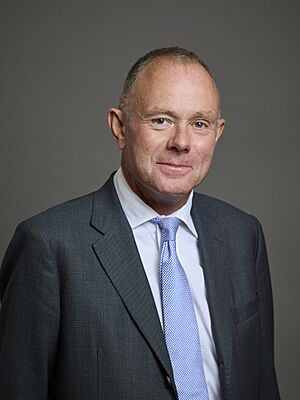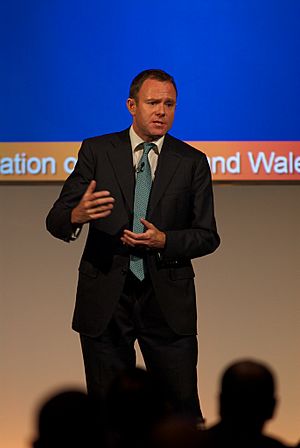Nick Herbert facts for kids
Quick facts for kids
The Lord Herbert of South Downs
|
|
|---|---|

Official portrait, 2025
|
|
| Minister of State for Policing and Criminal Justice | |
| In office 13 May 2010 – 4 September 2012 |
|
| Prime Minister | David Cameron |
| Preceded by | David Hanson |
| Succeeded by | Damian Green |
| Shadow Secretary of State for Environment, Food and Rural Affairs | |
| In office 19 January 2009 – 11 May 2010 |
|
| Leader | David Cameron |
| Preceded by | Peter Ainsworth |
| Succeeded by | Hilary Benn |
| Shadow Secretary of State for Justice | |
| In office 2 July 2007 – 19 January 2009 |
|
| Leader | David Cameron |
| Preceded by | Oliver Heald |
| Succeeded by | Dominic Grieve |
| Member of the House of Lords Lord Temporal |
|
| Assumed office 8 September 2020 Life Peerage |
|
| Member of Parliament for Arundel and South Downs |
|
| In office 5 May 2005 – 6 November 2019 |
|
| Preceded by | Howard Flight |
| Succeeded by | Andrew Griffith |
| Personal details | |
| Born |
Nicholas Le Quesne Herbert
7 April 1963 Cambridge, England |
| Political party | Conservative |
| Domestic partner | Jason Eades |
| Alma mater | Magdalene College, Cambridge |
Nicholas Le Quesne Herbert, Baron Herbert of South Downs (born 7 April 1963) is a British politician. He was a Member of Parliament (MP) for Arundel and South Downs from 2005 to 2019. He also served as a government minister. In 2020, he became a member of the House of Lords, which is part of the UK Parliament.
Contents
Early Life and Career
Nicholas Herbert went to Haileybury school and then Magdalene College, Cambridge. At Cambridge, he studied law and how land is used and managed. After college, he worked for the Conservative Party's research team, focusing on rural and environmental topics.
Working for Countryside Groups
In 1990, he became the director of public affairs for the British Field Sports Society. This group supported traditional countryside activities. He helped create the Countryside Movement, which later became the Countryside Alliance. This organization works to protect and promote rural life.
Campaigning for the Pound
Later, in 1998, Nicholas Herbert became the chief executive of Business for Sterling. This group campaigned against the UK adopting the Euro currency. Their campaign was successful, and the UK kept the pound sterling. This was an important moment in British politics.
Founding a Think Tank
In 2001, Herbert co-founded a think tank called Reform. A think tank is a group that does research and suggests ideas for government policy. Reform argued that public services could be improved without needing more taxes or government spending. Herbert was the first director of this organization.
Political Journey
Nicholas Herbert first tried to become an MP in 1997 but was not elected. In 2005, he was chosen to run for the Arundel and South Downs seat. He won this election and became an MP.
Joining the Shadow Cabinet
After becoming an MP, Herbert joined a committee that looked at home affairs. When David Cameron became the leader of the Conservative Party, Herbert was made a Shadow Minister for home affairs. A "Shadow Minister" is an opposition MP who watches over a government department. In 2007, he became the Shadow Secretary of State for Justice. Then, in 2009, he became the Shadow Secretary of State for Environment, Food and Rural Affairs.
Serving in Government
In May 2010, the Conservative Party formed a government with the Liberal Democrats. Nicholas Herbert was appointed a Minister of State. He worked in both the Home Office and the Ministry of Justice. His main roles were in policing and criminal justice. As Police Minister, he supported the idea of having elected Police and Crime Commissioners. He left his government role in September 2012.
Work as a Backbencher
After leaving government, Herbert continued to be an active MP. He helped create and co-chaired the All Party Parliamentary Group on Global TB. This group works to fight Tuberculosis (TB) around the world. He also launched the Global TB Caucus.
In 2014, he started GovernUp, a project that aims to improve how the government works. He also supported the legalisation of same-sex marriage in the UK. In 2015, he became the first chair of the All-Party Parliamentary Group on Global LGBT Rights. This group works to protect the rights of LGBT people worldwide.
Before the 2016 referendum, he supported the UK remaining in the European Union. In 2019, he became the chairman of the Countryside Alliance. In November 2019, he decided not to run for re-election as an MP.
After Parliament
On 1 September 2020, Nicholas Herbert became a member of the House of Lords. He was given the title Baron Herbert of South Downs.
Since January 2021, Lord Herbert has been the Chair of the College of Policing. This organization helps train and develop police officers. In May 2021, he was also appointed as the UK's Special Envoy on LGBT Rights. This means he represents the UK in promoting LGBT rights internationally.
Images for kids
 | James B. Knighten |
 | Azellia White |
 | Willa Brown |



